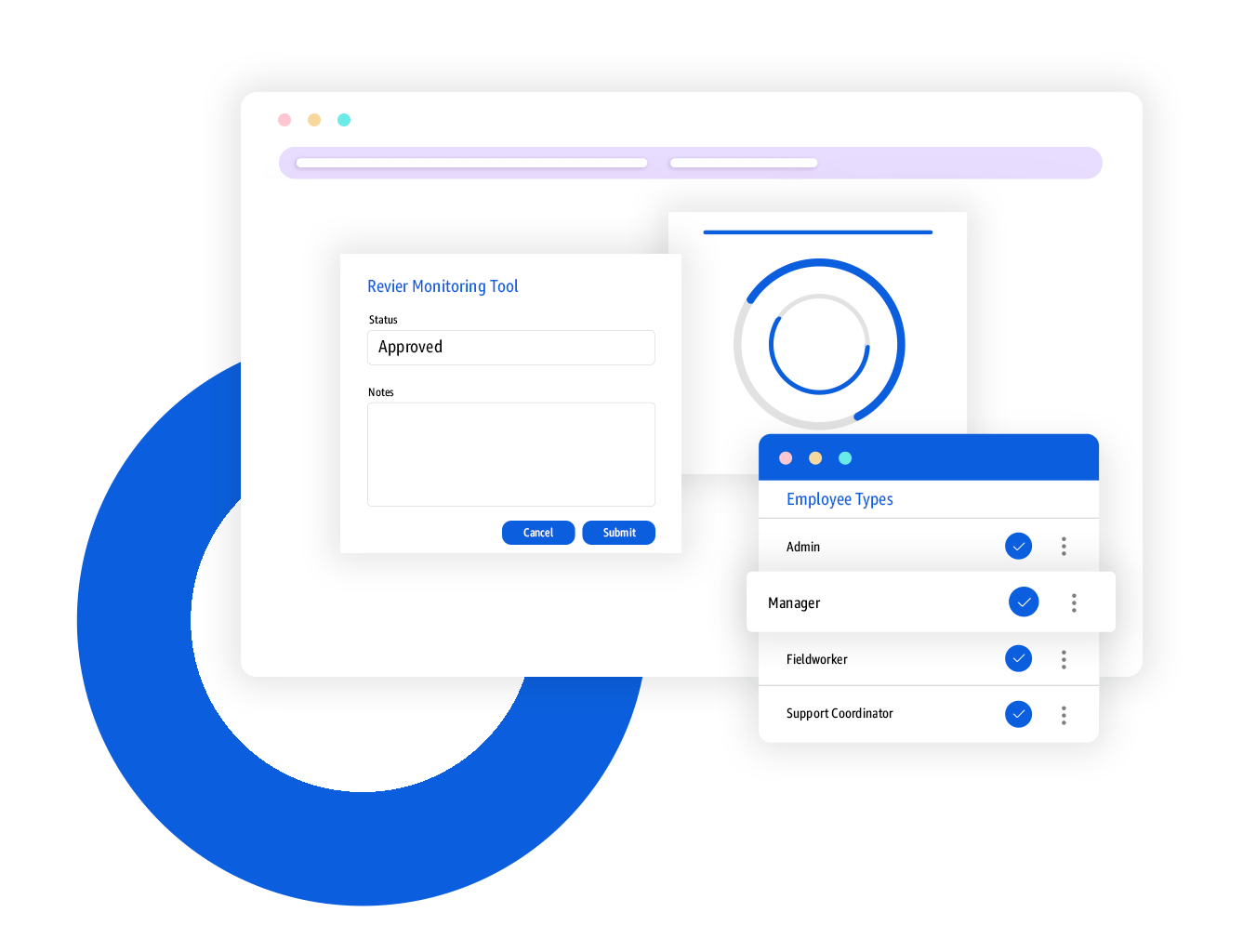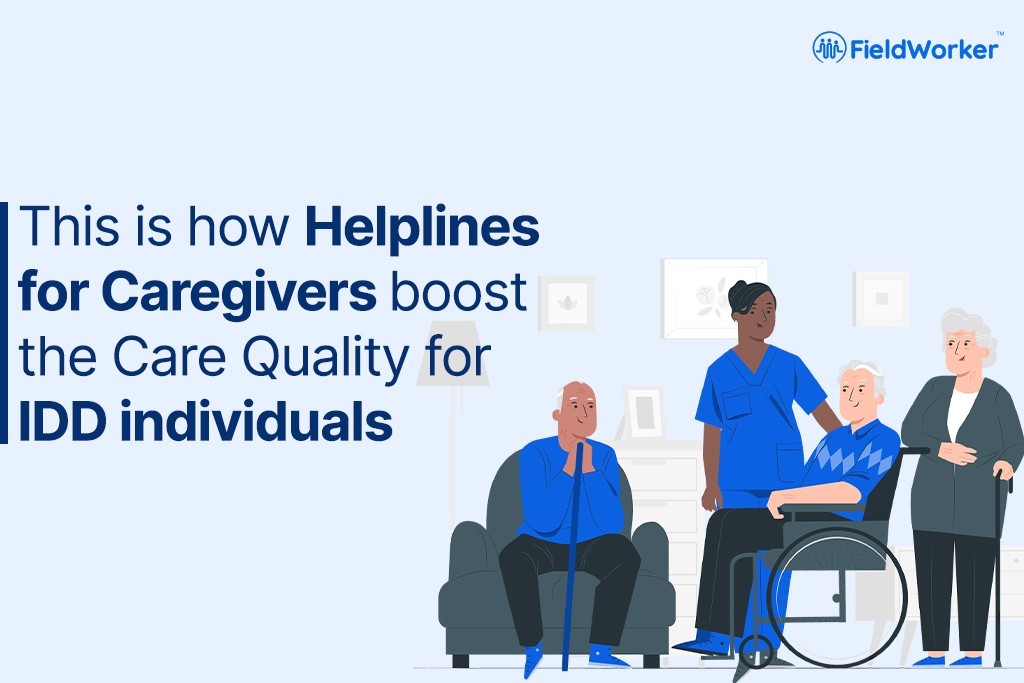Many of the challenges faced by caregivers of adults with IDDs are similar to those faced by caregivers of other older adults (for example someone with dementia). Even though older family caregivers of adults with IDD are likely to face challenges similar to those in the general caregiving community, they are also a special subset of the caregiving population who deal with situations that are noticeably different from those faced by caregivers of people who are transitioning to adulthood.
However, caregivers of adults with IDDs frequently have different caregiving patterns, face additional difficulties and stressors, and benefit from different sources of support and education.
Statistics of the IDD individuals and caregivers in the US:
In the United States, 65 million individuals provide care for elderly or disabled family members. Caregivers of seniors with intellectual and developmental disabilities (IDDs) are a crucial and frequently underappreciated category among these. At least 180,000 older persons with IDDs among the projected 46.2 million adults in the United States are 65 and older. IDD and dementia caregivers for adults confront many of the same issues as carers for other adulting individuals.
The common challenges faced by a caregiver to adulting IDD:
Even though providing care for family members can be a pleasant experience, caregivers frequently face typical difficulties that make them feel overwhelmed, apprehensive, and intimidated by their responsibilities. These are some of the difficulties a family caregiver encounters:
1. Time:
Caregivers discover that they have less time for other family members and themselves. They frequently devote so much time to caring responsibilities that they wind up forgoing activities they find enjoyable, such as hobbies or holidays. Or they struggle to coordinate their job schedules with caregiving.
2. Privacy:
After taking on a loved one, a family caregiver frequently complains about feeling a lack of solitude in the house, especially in smaller spaces. Setting limits to avoid repeated contact can be challenging.
3. Finances:
Most family carers are unpaid, which can cause them to experience some financial burden, particularly if providing care requires them to leave secured paying jobs. The financial impact on the family caregiver increases with the time they have been giving care.
4. Sleep:
Getting enough sleep might be difficult for a family caregiver because their loved one’s sleep cycle is mostly unpredictable. Lack of sleep can induce a caregiver who is already stressed from being burned out. This can further lead to stress and depression.
5. Depression:
Family caregivers are frequently at significant risk of developing depression. They frequently spend so much time on caring responsibilities that they no longer maintain social relationships outside the home.
6. Physical and Emotional strain:
22% of caregivers claim that providing care has negatively impacted their health. The emotional strain of caring for chronic diseases like dementia or Alzheimer’s seems to be the greatest. When the chores involve lifting and assisting with mobility, the physical demands of caregiving can also be taxing. Needless to say that the caregivers do not get time to give priority to their health and keep themselves fit.
7. Hormonal issues:
The parents and caregivers of individuals transitioning to adulthood have additional complications apart from those mentioned above.
The hormonal changes impact IDD as well as non-IDD individuals. So IDD individuals transitioning to adulthood would need additional support and care to help them cope with this. Moreover, the caregiver needs to understand the different ways to educate them.
Caregivers to children and transitioning adults with IDD frequently state that they do not want to discuss sex education with their children. Although teaching someone with intellectual disabilities may be challenging, it is still possible for them to learn with thorough instruction, visual assistance, and lots of repetition. The recent Joe vs Wade overturning has made it all the more important for caregivers to educate them about it.
Transitioning to adulthood for someone with intellectual and developmental disabilities might occasionally feel like a new start. A community of carers will give them a lot more put-together feeling while preventing them from feeling abandoned.
The care and duties that caregivers shoulder daily significantly impact society economically and sociologically. No one is better familiar with a person’s preferences and demeanor than their family members who take on the role of caregiver.
A startling 306 billion dollars would be spent each year if paid employees carried out the informal, unpaid activities performed by family carers.
So, what kind of support exists for Caregivers?
There are numerous websites that support caregivers like below:
Centers for Disease Control and Prevention Caregiving
The Public Health Center of Excellence on Dementia Caregiving
Websites With Caregiver Support Groups:
1. Family Caregiver Alliance
This San Francisco-based organization’s website includes, in addition to discussion groups, local resources, informative webinars, and advice on topics such as balancing work and senior care.
Challenge: In-depth information about caregiving is important but there is a need for a community that shares the ways to tackle a particular situation.
2. AARP Caregiving Resource Center
This Resource Center is having a presence from Alabama to Washington D C. Caregivers just starting out will find useful how-to articles here. There’s also a pill identifier to help you identify that random blue tablet on the floor. There are numerous message boards, some more active than others.
Challenge: Blogs and information for Caregivers are definitely important but lack in providing in-person help like a telephone helpline.
3. Alzheimer’s and Dementia Caregiver Center
This Chicago-based website is run by the Alzheimer’s Association, so there’s a lot more than message boards here. Examine the online tools, caregiver training options, and local support groups.
Challenge: The information and resources are specific to Alzheimer’s and Dementia caregivers.
4. CancerCare
You’ll find an ask-the-expert column, online educational workshops, and support groups organized around specific needs, such as an online, phone, and in-person group for caregivers in this New York-based portal.
Challenge: The information is specific to cancer care caregivers.
Specialized Caregiver Support Websites
The following websites specialize in caregiver tools—mostly free ones.
- Blog: CarePages
- Community: CareCentral
- Information: CareZone and eCare Diary
- In-person support: CaringBridge and Lotsa Helping Hands
- Financial support: GiveForward
These are useful resources that a website can provide, but when you need immediate assistance and your network breaks down, it’s not helpful. Though numerous resources and support communities exist for caregivers, they are scattered across the country, adding to the already stressed and overworked caregiver. As a result, there’s a need for a centralized system that assists and supports caregivers from beginning to end.
Centralized Support:
Sarah Adelman, the commissioner of human services for NJ, introduced a new helpline for caregivers of adults with intellectual developmental disabilities.
Here you can talk to a parent or a caregiver of a person with intellectual and developmental disabilities who have undergone a similar situation as yours. The department provides a wide range of services, including assistive technology, behavioral support, and employment aid, to support persons with Intellectual developmental disabilities and their families in addition to this helpline.
Dial 1-833-NJ-ADULT (1-833-652-3858) (daily from 8.30 a.m. to 8 p.m.).

